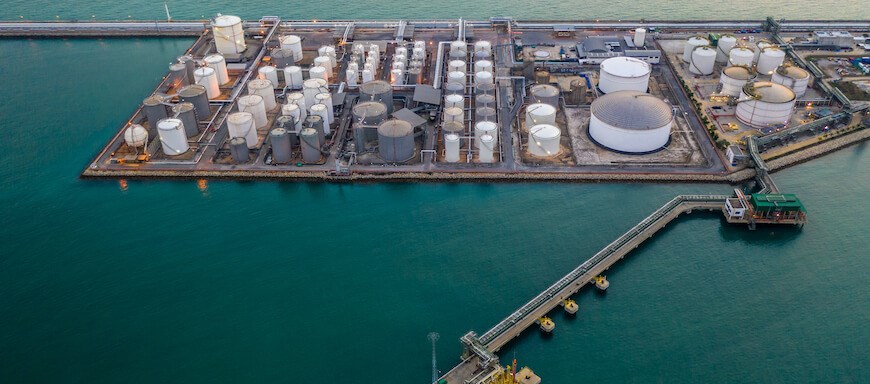Introduction
This Understanding LNG Terminals & Terminal Operations training program is designed to provide professionals in the Barging & Cargo Operations Unit with essential knowledge of LNG terminal operations, focusing on the logistical, transportation, and cargo handling aspects critical to the LNG supply chain. Participants will gain a comprehensive understanding of LNG terminal processes, from unloading LNG carriers to storage, regasification,
and loading for distribution. This course will also cover safety standards, operational procedures, and the
interaction between LNG terminals and cargo operations, ensuring smooth, efficient, and safe terminal operations.
Objectives
- Understand the role of LNG terminals within the global LNG supply chain.
- Learn about the various types of LNG terminals and their key operations.
- Gain knowledge of cargo operations specific to LNG terminals, including unloading, storage, and loading.
- Explore the safety, environmental, and regulatory aspects of LNG terminal operations.
- Develop skills for coordinating with various teams e.g., port operations, vessel management to ensure
- efficient LNG terminal operations.
- Understand best practices in LNG cargo handling and transportation logistics.
Organizational Impact
Improved Operational Efficiency: The course will provide participants with insights into LNG terminal
operations, improving coordination between barging, cargo handling, and terminal processes, leading
tomore efficient operations.
Enhanced Safety and Compliance: Participants will be trained on the safety measures, regulations, and
best practices necessary to mitigate risks in LNG cargo operations, ensuring compliance and reducing
accidents.
Better Decision-Making: Gaining a deeper understanding of LNG terminal operations will help
employees make more informed decisions regarding logistics, cargo handling, and coordination with
other terminal teams.
Optimized Cargo Handling and Logistics: The course will improve skills in the planning and execution of
LNG cargo operations, ensuring a smoother flow of cargo, reducing delays, and enhancing the overall
performance of LNG terminals.
Personnel involved in LNG barging, cargo handling, and transportation operations.
Cargo operations managers and supervisors.
Professionals working with LNG carriers and LNG terminal operators.
Safety and environmental officers in barging and cargo operations.
Logistics and terminal coordination teams in the Barging & Cargo Operations Unit.
Day 1: Introduction to LNG Terminals and the LNG Supply Chain
Overview of the LNG Industry and Market Dynamics
The Role of LNG Terminals in the Global LNG Supply Chain
Types of LNG Terminals: Import, Export, Floating Storage Regasification Units FSRUs
Interaction Between Barging & Cargo Operations and LNG Terminals
Regulatory and Safety Framework Governing LNG Terminal Operations
Day 2: LNG Terminal Layout and Key Operations
- Basic Components of an LNG Terminal: Unloading, Storage, and Regasification
- Jetty Operations and LNG Carrier Unloading Procedures
- LNG Storage: Tanks, Pressure Systems, and Safety Measures
- Loading LNG onto Vessels for Distribution
- Coordination Between Barging & Cargo Operations and Terminal Personnel
Day 3: LNG Cargo Handling and Transportation
- LNG Cargo Handling Procedures: Loading, Unloading, and Transfer Operations
- Safety Protocols for LNG Cargo Handling Leak Detection, Spill Response, etc.
- The Role of Barging in LNG Terminal Operations: Types of Barges and Vessels
- Scheduling and Coordination of LNG Vessel Arrivals and Departures
- Temperature Control and Pressure Maintenance During Transport
Day 4: Safety, Environmental, and Regulatory Considerations
- International and Local Regulations for LNG Cargo Operations
- Environmental Impact and Risk Management in LNG Transport and Handling
- LNG Terminal Safety Standards: HAZOP, Safety Management Systems
- Emergency Response and Contingency Plans for LNG Operations
- Case Studies on LNG Cargo Accidents and Lessons Learned
Day 5: Best Practices in LNG Terminal Operations and Future Trends
- Optimizing LNG Cargo Handling and Logistics Efficiency
- Integration of Digital Technologies in LNG Terminal Operations e.g., Automation, Monitoring
- Training and Development for LNG Terminal and Cargo Operations Personnel
- Emerging Trends in LNG Terminals: Floating LNG, Sustainability, and Green Shipping
- Review, Q&A, and Practical Exercises on LNG Terminal and Cargo Operations

